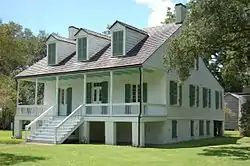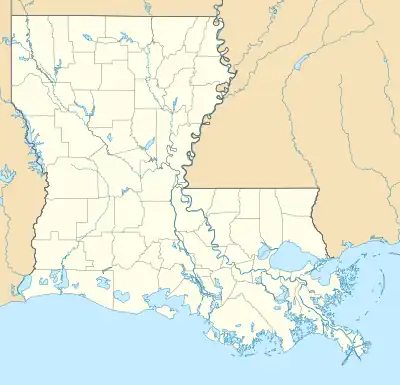Edward Douglass White House | |
 | |
  | |
| Location | 2295 LA 1, Thibodaux, Louisiana |
|---|---|
| Coordinates | 29°49′27″N 90°54′41″W / 29.8242°N 90.91152°W |
| Area | 3 acres (1.2 ha) |
| Built | 1790 |
| NRHP reference No. | 76000964[1] |
| Significant dates | |
| Added to NRHP | December 8, 1976 |
| Designated NHL | December 8, 1976[2] |
The Edward Douglass White House, also known as Edward Douglass White Louisiana State Commemorative Area, is a state historic site near Thibodaux, Louisiana. The house was home to both Edward Douglass White, Sr., the tenth governor of the state of Louisiana, and his son, Edward Douglass White, a U.S. senator and a Chief Justice of the United States. It was designated a National Historic Landmark in 1976 for its association with the latter White, who was in the 7-1 majority ruling on Plessy v. Ferguson, 163 U.S. 537 (1896), a landmark decision of the U.S. Supreme Court that upheld the constitutionality of racial segregation laws for public facilities in a doctrine that came to be known as "separate but equal."
History
The house was built from hand-hewn cypress as a Creole-style raised cottage. The house was built on the banks of Bayou Lafourche facing what is now Louisiana Highway 1. E.D. White, Sr. purchased the property in 1829 from Guillaume Arcement, and around 1834 began remodeling the house to reflect the prevalent Greek revival style of architecture.[3] It was declared a National Historic Landmark in 1976.[2][4]
Architecture
The main floor includes a central hallway dividing four rooms, reflecting the typical symmetry of Greek Revival architecture. An inverted stairwell at the end of the hall leads to two bedrooms on the second floor. The high ceilings, wide front gallery, and raised brick cellar served to cool the house during the summer.[3]
Museum
The house is owned by the Louisiana State Museum and is operated as a historic house museum known as the E. D. White Historic Site. An exhibit inside the home demonstrates the history of the Bayou Lafourche area, with features on the Chitimacha Indians, Acadian settlers, slavery, sugar cane plantations, and the White family.[3]
See also
References
- ↑ "National Register Information System". National Register of Historic Places. National Park Service. November 2, 2013.
- 1 2 "Edward Douglass White House". National Historic Landmark summary listing. National Park Service. Archived from the original on March 8, 2011. Retrieved January 31, 2008.
- 1 2 3 "E.D. White Historic Site - Louisiana State Museum". Retrieved January 25, 2015.
- ↑ George R. Adams and Ralph Christian (April 1976). "National Register of Historic Places Inventory-Nomination: Edward Douglass White House / Edward Douglass White Louisiana State Commemorative Area" (pdf). National Park Service.
{{cite journal}}: Cite journal requires|journal=(help) and Accompanying 2 photos, exterior, from 1976. (999 KB)
External links
![]() Media related to Edward Douglass White House at Wikimedia Commons
Media related to Edward Douglass White House at Wikimedia Commons
- E. D. White Historic Site - Louisiana State Museum


